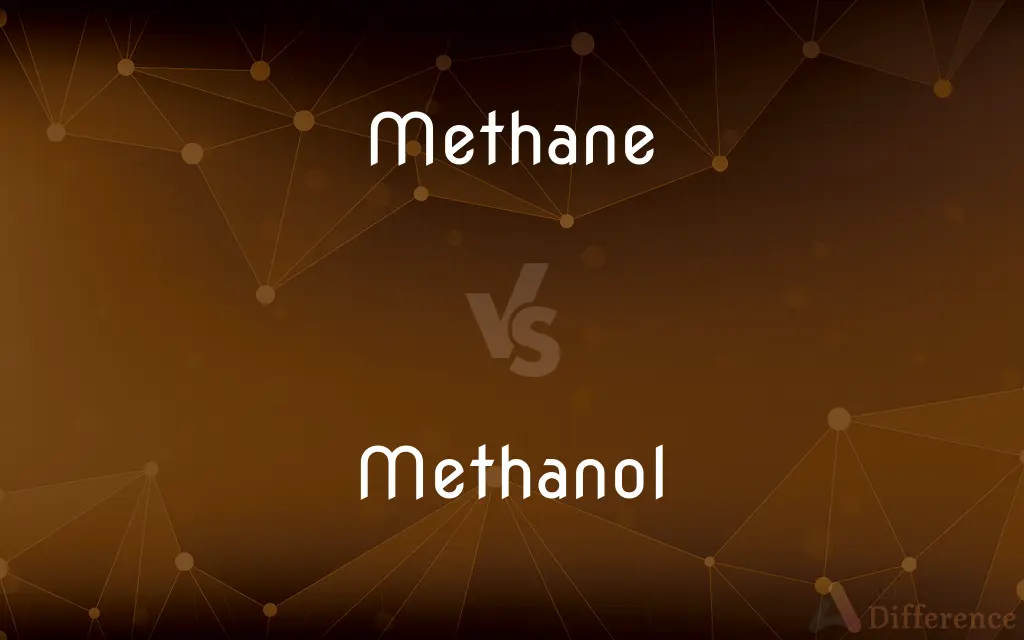Methane vs. Methanol — What's the Difference?
By Tayyaba Rehman — Updated on October 31, 2023
Methane is a simple hydrocarbon gas (CH4) and a primary component of natural gas, whereas methanol is a liquid alcohol (CH3OH) used as a solvent and fuel.

Difference Between Methane and Methanol
Table of Contents
ADVERTISEMENT
Key Differences
Methane is a colorless, odorless gas at standard temperature and pressure, primarily known as the simplest alkane and a major component of natural gas. Methanol, on the other hand, is a simple alcohol, which is a liquid at room temperature, used in a variety of chemical processes and as an alternative fuel. Both methane and methanol consist of carbon and hydrogen atoms, but methanol also contains an oxygen atom, altering its properties and uses significantly.
In terms of chemical structure, methane is the smallest hydrocarbon, consisting of one carbon atom tetrahedrally bonded to four hydrogen atoms. Methanol includes a hydroxyl group, making it part of the alcohol family. Despite both being organic compounds, methane is a gas used primarily for heating and energy production, while methanol is a versatile solvent and fuel additive.
Methane, with its single carbon atom, serves as a crucial energy source but is also a potent greenhouse gas contributing to global warming. Methanol is utilized not only as a solvent but also in the production of formaldehyde and acetic acid, highlighting its importance in the chemical industry. While methane's impact on the climate is a subject of environmental concern, methanol's toxicity poses risks to human health if ingested.
As energy sources, both methane and methanol have their benefits and drawbacks. Methane burns more cleanly than coal and oil, producing carbon dioxide and water. Methanol can be made from renewable sources and is used in fuel cells and as an alternative fuel for vehicles, but it is toxic and less energy-dense than methane.
Comparison Chart
Chemical Formula
CH4
CH3OH
ADVERTISEMENT
Physical State
Gas at room temperature
Liquid at room temperature
Main Uses
Fuel (heating, electricity), chemical feedstock
Solvent, antifreeze, fuel, chemical intermediate
Environmental Impact
Greenhouse gas
Toxic if ingested, biodegradable
Source
Natural gas deposits, biomass decay
Synthetic production, biomass
Compare with Definitions
Methane
A flammable hydrocarbon gas with the chemical formula CH4.
Methane is commonly used as a fuel for cooking and heating.
Methanol
A volatile, colorless liquid used as an industrial solvent.
Methanol is often used in the production of paints and varnishes.
Methane
A colorless, odorless gas formed naturally by the decomposition of organic matter.
Methane is released from landfills as waste breaks down.
Methanol
A chemical feedstock for formaldehyde and various other industrial products.
The production of adhesives frequently utilizes methanol-derived formaldehyde.
Methane
A primary component of natural gas extracted from the earth.
Methane is transported through pipelines from its extraction sites to power plants.
Methanol
A toxic substance that can cause metabolic acidosis if ingested.
Methanol is hazardous and must be handled with care in industrial settings.
Methane
The simplest alkane and a significant contributor to the greenhouse effect.
Methane emissions from livestock are a concern for climate change.
Methanol
A renewable fuel that can be used in internal combustion engines.
Methanol is being considered as an alternative fuel to decrease reliance on fossil fuels.
Methane
A potential energy source for electricity generation and industrial processes.
Methane can be converted to electricity via gas turbines or fuel cells.
Methanol
The simplest alcohol with a chemical formula of CH3OH.
Methanol can be produced from the catalytic hydrogenation of carbon monoxide.
Methane
Methane (US: , UK: ) is a chemical compound with the chemical formula CH4 (one atom of carbon and four atoms of hydrogen). It is a group-14 hydride and the simplest alkane and is the main constituent of natural gas.
Methanol
Methanol, also known as methyl alcohol amongst other names, is a chemical and the simplest alcohol, with the formula CH3OH (a methyl group linked to a hydroxyl group, often abbreviated MeOH). It is a light, volatile, colourless, flammable liquid with a distinctive alcoholic odour similar to that of ethanol (potable alcohol).
Methane
An odorless, colorless, flammable gas, CH4, the major constituent of natural gas, that is used as a fuel and is an important source of hydrogen and a wide variety of organic compounds.
Methanol
A toxic, colourless, volatile flammable liquid alcohol, made chiefly by oxidizing methane.
Methane
The simplest aliphatic hydrocarbon, CH₄, being a constituent of natural gas, and one of the most abundant greenhouse gases.
Greenhouse gas
Cattle emit a large amount of methane.
Methanol
A colorless, toxic, flammable liquid, CH3OH, used as an antifreeze, a general solvent, a fuel, and a denaturant for ethyl alcohol. Also called carbinol, methyl alcohol, wood alcohol, wood spirits.
Methane
Any of very many derivatives of methane.
Methanol
(organic compound) The simplest aliphatic alcohol, CH3OH; a colourless, toxic, inflammable liquid, used as a solvent, antifreeze, in the chemical industry, and in the preparation of methylated spirit.
Methane
A light, colorless, gaseous, inflammable hydrocarbon, CH4; marsh gas. It is the simplest of the aliphatic hydrocarbons. See Marsh gas, under Gas.
Methanol
The simplest alcohol of the paraffin series, CH3.OH; methyl alcohol. Called also wood alcohol. It is used as an antifreeze solvent, as a fuel, and as a denaturant for ethyl alcohol.
Methane
A colorless odorless gas used as a fuel
Methanol
A light volatile flammable poisonous liquid alcohol; used as an antifreeze and solvent and fuel and as a denaturant for ethyl alcohol
Common Curiosities
What industries use methane?
The energy sector uses methane for heating, electricity, and as a chemical feedstock.
What is the main source of methane?
The main sources of methane are natural gas deposits and the decomposition of organic matter.
Can methanol be used as an energy source?
Yes, methanol can be used as a fuel in internal combustion engines and fuel cells.
Can methane be used as a vehicle fuel?
Yes, methane is used as a vehicle fuel in the form of compressed natural gas (CNG).
How does methane affect the environment?
Methane is a potent greenhouse gas that contributes to global warming.
What is methanol used for?
Methanol is used as a solvent, antifreeze, fuel, and chemical intermediate.
Is methanol safe to consume?
No, methanol is toxic and can cause blindness or death if ingested.
Is methanol biodegradable?
Yes, methanol is biodegradable under the right conditions.
Is methane dangerous?
Methane is highly flammable and can be explosive when mixed with air, but it is not toxic.
How is methanol produced?
Methanol is produced synthetically from carbon monoxide and hydrogen or from biomass.
What precautions are necessary when handling methane?
Proper ventilation and leak detection systems are crucial due to methane's flammability.
Why is methanol important in the chemical industry?
Methanol is a key feedstock for various chemicals and polymers, including plastics and resins.
What is the difference between ethanol and methanol?
Ethanol is a drinkable alcohol found in beverages, while methanol is toxic and used industrially.
How is methane captured and stored?
Methane can be captured from sources like landfills and stored in tanks or underground.
Can methanol be made from natural gas?
Yes, methanol can be synthesized from natural gas via gas-to-liquids technology.
Share Your Discovery

Previous Comparison
Type vs. Kind
Next Comparison
Sigogglin vs. SkewedAuthor Spotlight
Written by
Tayyaba RehmanTayyaba Rehman is a distinguished writer, currently serving as a primary contributor to askdifference.com. As a researcher in semantics and etymology, Tayyaba's passion for the complexity of languages and their distinctions has found a perfect home on the platform. Tayyaba delves into the intricacies of language, distinguishing between commonly confused words and phrases, thereby providing clarity for readers worldwide.















































